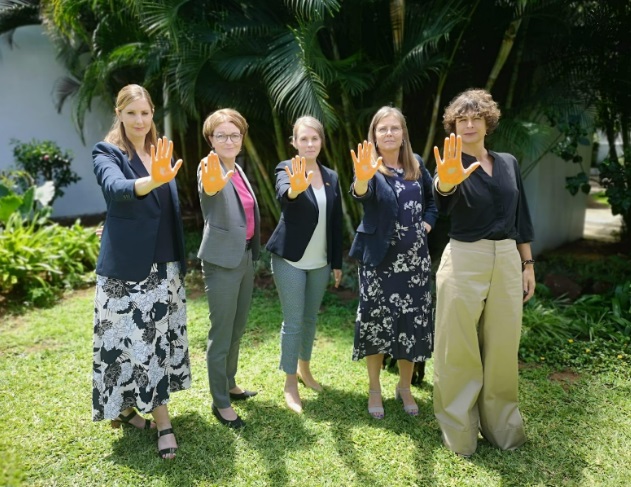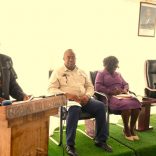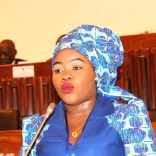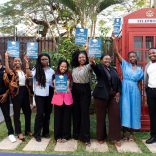Maputo province: 268 admitted to health units for substance abuse in Q3
Op -Ed | 16 Days of Activism against Gender-Based Violence – Mozambique can’t afford to lose the battle against Child Early and Forced Marriage (CEFM)

The High-Level Policy Dialogue Group against CEFM is an informal group that started in 2016 with a commitment to support the Government of Mozambique in its efforts to combat early marriage through targeted advocacy and policy dialogue. The group, which started with two ambassadors, now features five, coincidentally all women, representing countries that view gender equality and the promotion of Sexual and Reproductive Health and Rights (SRHR) as priorities for their programming, policy and advocacy in Mozambique.
Early marriage is a fundamental abuse of the basic human rights of the victims and threatens their lives, well-being and futures. It robs girls of their agency to make decisions about their lives while jeopardizing their health, making them more vulnerable to violence, discrimination and abuse, and preventing their full participation in economic, political and social life. It is, in and of itself, a form Gender-Based Violence (GBV) that deserves attention during these 16 Days of Activism. This is particularly true in Mozambique where nearly one in two girls is married before the age of 18, which is one of the highest rates in the world.
In 2016, Mozambique launched the National Strategy to End Premature Unions involving all sectors of government, civil society actors and development partners in an unprecedented collective undertaking to address the root causes of this destructive practice, including by changing harmful social norms, while improving the legal framework and service delivery for prevention and response. One of the major achievements to come out of the strategy was the approval, in 2019, of a law to prevent and end early unions, which set a significant example for peers across Africa and clearly signalled to the world that Mozambique was committed to ending this scourge. This milestone was the result of years of advocacy by civil society organizations, often with the support of this group, to criminalize a then widely accepted practice based on harmful gender norms and power relations.
The approval of the law cleared the path for government actors, activists, civil society organizations, and children themselves to start informing relatives and key community actors about the new illegality of the practice and contributed to the emergence of an environment where the removal of girls already trapped in early and forced unions became a possibility. Unfortunately, the devastating consequences of Cyclones Idai and Kenneth in 2019, followed by the COVID-19 pandemic the year after, and the escalation of the conflict in Cabo Delgado has hindered the dissemination and applicability of the law in the most hard-to-reach areas and limited the effectiveness of its implementation, and thus its impact on young girls and boys.
Gender inequality puts girls and women at higher risk of GBV, including early and forced marriage, and they are disproportionately vulnerable to the impacts that conflict and natural disasters can have on income, access to services and resources. Prevention measures put in place to combat COVID-19 negatively impacted sources of income and access to services, while also contributing to the increased isolation of the population, leaving girls more vulnerable to early marriage as their families increasingly turned to the practice as a coping mechanism against extreme poverty.
Young women and girls have also seen their vulnerability compounded by the ongoing conflict in northern Mozambique, which has already caused nearly one million people to be displaced internally. Many have been forced to abandon school and even their homes, leaving them at risk of several forms of abuse simply to find a means to survive. In fact, the rate of child marriage among displaced children in northern Mozambique has increased by 65% between 2021 and 2022. As Mozambique takes up its position as an elected member of the UN Security Council, there is an opportunity to spotlight and accelerate further progress on women, peace, and security to contribute to ending early marriage in the country.
The battle to end early marriage and enhance the development and well-being of hundreds of thousands of young women and girls requires a renewed push to improve the enforcement of the existing legislation in Mozambique. This is vital to ensuring that women and girls can benefit fully from their basic human rights and because evidence shows that when women are able to develop to their full economic potential, economies thrive and the benefits of growth reach more people. In Mozambique alone, the economic returns of preventing early marriage and keeping girls in school are estimated at 30% of GDP. In a nation where women and girls represent more than 50% of the population, failing to protect and empower them thus not only prevents over half of the population from fully contributing to the development of their country, it also jeopardizes the well-being of their families, their communities and society at large.
The good news is that Mozambique and partners know what to do – End Violence Against Women and Girls Now! Promote inclusive systems, improve access to services, keep girls in school, protect them from conflict-related violence, and provide boys and girls with equal opportunities. By doing so, communities in Mozambique can ensure that no girl finds herself in a situation in which she is forced to marry before the age of 18 or against her will, either due to social pressures or as a survival mechanism.
The 16 Days of Activism against Gender-Based Violence is an annual global advocacy campaign to end all forms of GBV which utilizes the colour orange to represent a brighter future. As we close this year’s 16 Days, join us in calling for action against early marriage, a battle that the girls of Mozambique cannot afford to lose.
Anna-Kaisa Heikkinen, Ambassador of Finland to Mozambique, Eswatini and Madagascar
Elsbeth Akkerman, Ambassador of the Kingdom of the Netherlands to Mozambique
Helen Lewis, British High Commissioner to the Republic of MozambiqueMette Sunnergren, Ambassador of Sweden to Mozambique
Sara Nicholls, High Commissioner of Canada to Mozambique












Leave a Reply
Be the First to Comment!
You must be logged in to post a comment.
You must be logged in to post a comment.